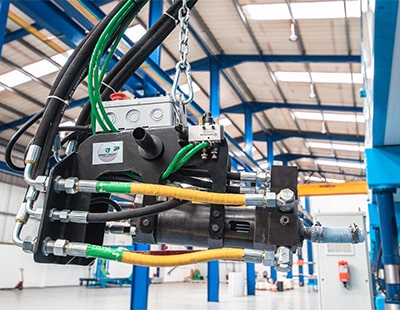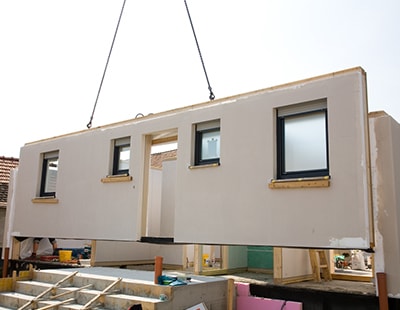NHBC has been a long-standing supporter of innovation within construction and its experienced MMC team will be offering a personalised approach via various channels and dedicated touchpoints, ‘providing added value and confidence’.
Richard Lankshear, NHBC’s innovation manager, said: “The case for innovative forms of construction has strengthened and, as housebuilding resumes, the drive to transform construction is accelerated.”
He added: “We expect to see more innovative construction solutions emerge over coming years and NHBC’s thorough and rigorous approach to new MMC systems will help bring benefits to manufacturers, developers and builders.”
He said that all new homes across the UK that are covered by NHBC’s Buildmark warranty are inspected at key stages during construction by its ‘directly employed and highly skilled team’ of more than 350 inspectors.
“An NHBC Accepts certificate is a way of demonstrating that innovative products or systems have already been reviewed thus reducing the risk of delays on site,” he explained.
“NHBC Accepts will play a critical role in ensuring developers, manufacturers, lenders and consumers have faith and confidence in MMC quality as the industry delivers more innovative new homes for the country.”
Mark Farmer, chief executive of Cast Consultancy and author of the Farmer Review of the construction industry, added: “I welcome the launch of NHBC Accepts. It’s a step forward that sees the UK market leader in warranty and insurance for new homes making its commitment to high-quality modern methods of construction clear.”
How did the industry react?
Mary-Anne Bowring, group managing director at property management firm Ringley, said that the (MMC) industry has made significant progress in recent years, thanks to government support and private investment.
“This acceptance from the NHBC will encourage further investment into MMC, which will be critical to greening Britain’s new housing supply,” she commented.
“Institutional investment into alternative residential asset classes like Build to Rent and student accommodation has been key to driving the growth in MMC to date as MMC offers a number of qualities highly attractive to institutional investors such as quicker build time, improved energy performance and reduced waste and vehicle traffic on-site.”
She added: “MMC gives institutional investors such as pension funds and insurers quicker access to greener, more sustainable and efficient assets that can produce the long-term income streams needed to match their liabilities.”
Joseph Daniels, founder and chief executive at eco housing developer Etopia, said: “This will be a really powerful force for better informing mortgage lenders and the wider financial services industry that homes manufactured in factories are not only fully insurable, but can often outperform traditionally built homes.”
He continued: “Our own technology has been designed to exceed current building regulations and will ensure that, by using smart living technology, Etopia developments will deliver both better quality and exceptionally energy-efficient homes.”
Further attempts to green the housing market
Modern methods of construction are designed to be more flexible, sustainable and eco-friendly, but more traditional developers are also seeking to enhance their green credentials.
Urban Catalyst, the developer that is currently leading the £1 billion regeneration of Purfleet-on-Thames town centre, has appointed one of the world’s leading climate scientists as a sustainability adviser to help inform its sustainability strategy.
Professor Trevor Davies has over 50 years’ experience studying atmospheric science and climate issues, and his appointment comes amidst growing public support for a ‘green recovery’ post-pandemic.
Air quality improved dramatically during lockdown as the number of cars on the roads fell dramatically and planes were grounded across the world, and there is a desire from environmentalists for this to continue even as life slowly returns to normal.
Professor Davies, who will not receive any financial benefits in his role as sustainability adviser to Urban Catalyst, has been Director of the Climatic Research Unit at the University of East Anglia (UEA) and was a driving force behind the establishment of the Tyndall Centre for Climate Change Research, where he was Director of International Development. The Tyndall Centre is headquartered at UEA, and includes the universities of Cardiff, Manchester, Newcastle and Sussex, as well as Fudan University in Shanghai, China, where Professor Davies was previously ‘Distinguished Professor’.
Urban Catalyst insists that sustainable place-making promoting healthy living was already a key focus of its before Professor Davies' appointment. Nonetheless, with lockdown driving global support for a green recovery, the developer is bringing outside academic expertise to better inform its current and future schemes.
The £1 billion Purfleet-on-Thames regeneration, which Urban Catalyst is delivering jointly with Swan Housing Association and in partnership with Thurrock Council, employs a number of design features to minimise car use and support pedestrians and cyclists. These include:
- New routes that accommodate an integrated mix of travel methods (vehicle, scooter, cycle, walking)
- Putting shops, employment space and community uses within walking distance of residential areas
- Designing-in support services such as bike storage, electric charging points and car clubs
- Using design to reduce necessary daily trips by vehicle to achieve a reduction in congestion
- Speeds for vehicles reduced to 20mph with speed cameras and controlled junctions
- Expansions to bus networks linking place of work and interest, centered around the new town centre
- Improved access to Purfleet station
This focus on health and wellbeing in Purfleet-on-Thames led Urban Catalyst to become a member of the NHS Healthy New Towns Network, alongside major companies such as British Land, Peabody and listed housebuilder Redrow. The mixed-use developer will also form part of the wider green growth plan across the entire Thames Estuary.
Ken Dytor, executive chairman and founder of Urban Catalyst, who previously worked for British Land and the Crown Estate, said: “There has never been a more opportune time to push property development in a direction that is both good for our planet and our wellbeing. People are realising how interlinked environmental and public health issues are in lockdown and already we are seeing more and more cities push ahead to make themselves greener and cleaner.”
He added: “Creating places that promote sustainable and healthy living has always been our aim and by having Professor Davies onboard as an adviser we hope to benefit from his immense expertise and knowledge to find real world applications for his research and long-standing interest in carbon reduction to our developments.”
Professor Davies said sustainability had fallen up and down the agenda for the past few decades, but argued there is now a clear potential for building on the widespread change in attitudes during the pandemic.
“Lockdown has made many realise the negative effects we have on our environment as a species and in turn how that impacts our own health,” he explained.
“I will be working closely with Urban Catalyst to see how use of technology - both at a large-scale but also at a more granular level - combined with intelligent urban design can create places that are more sustainable, resilient and healthier, and I am delighted to have been appointed as the firm’s chief sustainability adviser.”










.png)









Join the conversation
Be the first to comment (please use the comment box below)
Please login to comment